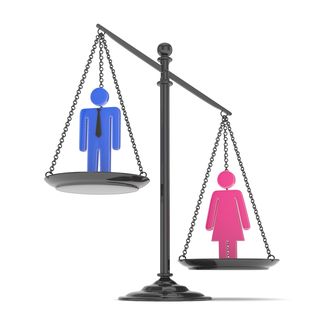Orgasm
Achieving Equality in the Boardroom and the Bedroom
It's Women's Equality Day. Let's work towards equal-opportunity orgasms!
Posted August 26, 2017
On August 26, 1920, the 19th Amendment to the Constitution was certified, thereby granting women the right to vote. To commemorate this critical day in women's history, in 1971 the U.S. Congress designated August 26 as Women's Equality Day. As explained by the National Women's History Project, the observance of this day "...not only commemorates the passage of the 19th Amendment, but also calls attention to women’s continuing efforts toward full equality."

Gender inequality still exist in many realms in the U.S., as do many other societal inequities including (but not limited to) those based on sexual orientation, gender identity, disability, and race. When talking about racial inequities in the healthcare system, Dr. Peter Slavin made the brilliant and powerful statement that "There can be no quality without equality." This applies to all realms of inequality. It applies to equality in a realm often considered quite personal: Sexual pleasure. As I say in Becoming Cliterate, "Quality sex is only possible with true sexual equality. We've never—at any point in Western History—had a time where the majority of the population valued women's way of orgasm as equal to a man's. It's time to change history."
For the vast majority of men, the most reliable route to orgasm is penile stimulation (oral sex, intercourse) whereas for the vast majority of women, it is clitoral stimulation, either alone or coupled with penetration. Indeed, about 95% of women need some form of clitoral stimulation to experience orgasm. In Becoming Cliterate, I argue that our cultural silence, devaluing, and ignorance about the clitoris (our cultural illcliteracy), combined with other aspects of gender socialization (e.g., slut shaming), our sorely lacking sex education system, and false media images of women having fast and fabulous orgasms from penetration alone are fueling an orgasm gap. I provide data regarding this gap, including for example the striking statistic that 55% of men versus 4% of women experience orgasm during first-time hookup sex and that this gap closes, but still remains, in relationship sex. I argue that to close this gap completely we need both cultural and individual change. Cultural changes advocated include a linguistic sexual revolution—changing our language around sex and female genitals, and calling an end to slut and body shaming. Personal skills and information provided include information on women's genital anatomy, sex-positive thinking, mindfulness, learning one's own most reliable route to orgasm by "taking matters into one's own hands," sexual communication skills, and new sexual scripts to replace the outdated "foreplay, intercourse, game over" routine that we currently use. All of this information is then reflected in and culminates in "Twelve Commandments for Orgasm Equality and Quality Sex."

I hope you will be inspired to follow these commandments in your own life (and as applicable, teach them diligently to your children, now or in the future). Perhaps you will even make a copy and display them where someone will see them or ask about them. (I recently had a friend tell me she displays Becoming Cliterate on her coffee table, just for this purpose—to spur conversations about orgasm equality and quality sex).

Orgasm equality is certainly not the most critical or serious inequity that need attention on Women's Equality Day. There are many serious and horrific inequities in our culture, some life-threatening to those who face them. Because of this, I've at times wondered if my quest to close the orgasm gap is worthwhile. I've concluded that it is. I've seen the pain, confusion, and sadness that comes from a lack of sexual pleasure, with many women even enduring sexual pain due to lack of knowledge or agency around their own sexual response. Closing the orgasm gap doesn't render the other inequities as less important and in fact, we can trace all gender inequities to the same root source. Feminists have long explained that the personal is political. The very personal lack of sexual pleasure that women have is no exception. What differentiates it from other inequities, however, is that with some simple knowledge and skills, you can close this gap in your own life. Do it today—in honor of Women's Equality Day.


